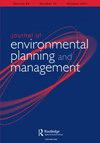军事文化不能推动环境可持续性的神话?军事文化对亲环境行为的跨层次影响
IF 3.6
4区 经济学
Q1 DEVELOPMENT STUDIES
Journal of Environmental Planning and Management
Pub Date : 2023-09-18
DOI:10.1080/09640568.2023.2222227
引用次数: 0
摘要
摘要推进可持续发展目标(sdg)是一项重要的政府政策,军队是负责建设性事务的政府部门。然而,很少有研究探讨军人社会责任感知对环境态度和绿色组织公民行为的影响。本研究通过将组织认同理论应用于军队,开发了一个关于可持续性的研究框架,从而解决了这一研究缺口。研究结果表明,军人社会责任感知对改善环境态度和绿色组织公民行为、促进可持续发展具有重要作用。这些结果可为各军事单位实现可持续发展目标提供参考,并为可持续管理提供实际意义。关键词:军事文化感知军队社会责任组织公民环境行为环境态度环境意识致谢作者感谢洪云婷、常万琳、黄ten - yu和袁元迪在本工作前期协助搜集相关文献。作者贡献:常泰伟提出了研究框架和思路。洪承泽用英文撰写论文,并编辑原稿。蒋凤毅提出了研究并对结果进行了分析。颜国清搜集整理文献资料。披露声明作者未报告潜在的利益冲突。本文章由计算机程序翻译,如有差异,请以英文原文为准。
The myth that military culture could not drive environmental sustainability? Cross-level influence of military culture on pro-environmental behavior
AbstractThe promotion of sustainable development goals (SDGs) is a crucial government policy, and military units are government departments responsible for constructive affairs. However, few studies have explored the effects of perceived military social responsibility on environmental attitude and green organizational citizenship behavior. The present study addresses this research gap by developing a research framework regarding sustainability by applying organizational identity theory to the military. The results indicate that perceived military social responsibility is crucial in improving environmental attitude and green organizational citizenship behavior and promoting sustainable development. These results can be used as a reference by military units to achieve sustainable development goals and provide practical implications for sustainable management.Keywords: military cultureperceived military social responsibilityorganizational citizenship behavior for the environmentenvironmental attitudeenvironmental awareness AcknowledgmentsThe authors are grateful to Yun-Ting Hung, Wan-Lin Chang, Ten-Yu Huang, and, Syuan-Di Yuan for assistance in the collection of the related literature at the early stage of this work.Author contributionsTai-Wei Chang proposed the research framework and ideas. Cheng-Ze Hung wrote the paper in English and edited the manuscript. Feng-Yi Jiang proposed the research and analyzed the results. Kuo-Ching Yen collected and organized literature materials.Disclosure statementNo potential conflict of interest was reported by the author(s).
求助全文
通过发布文献求助,成功后即可免费获取论文全文。
去求助
来源期刊
CiteScore
9.10
自引率
5.10%
发文量
155
期刊介绍:
Journal of Environmental Planning and Management has already established itself as a leading forum for up-to-date scholarly but accessible papers on all aspects of environmental planning and management. With contributions from leading international authors, the Journal publishes influential, high quality papers -an essential feature whether you are a subscriber, reader, contributor or all three. The Editors and International Editorial Advisory Board are drawn from around the world and are committed to encouraging researchers and practitioners to contribute to multidisciplinary and international debate in the field. The central aim is to focus on the integrated planning and management of the environment.

 求助内容:
求助内容: 应助结果提醒方式:
应助结果提醒方式:


